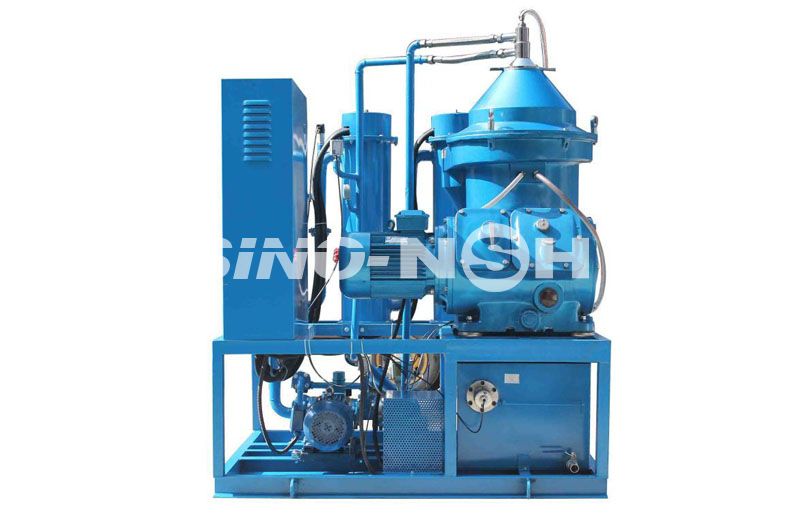Choosing the best lubricating oil purifier depends on your specific needs, such as the type of contamination in the oil (e.g., water, solid particulates), the volume of oil to be treated, and the condition of the existing oil. Here are some factors to consider when selecting a lubricating oil purifier, along with a few popular types:

1. Types of Lubricating Oil Purifiers
There are several types of oil purifiers, each designed to address different types of contamination. Here are the most common:
A. Vacuum Oil Purifiers
- How it works: These purifiers work by creating a vacuum environment where water and other volatile contaminants evaporate at lower temperatures. The purified oil is then collected.
- Best for: Removing water (both free and emulsified) and light contaminants.
- Pros:
- Effective at removing water and volatile contaminants.
- Preserves the quality of the oil.
- Can handle high-viscosity oils.
- Cons:
- Slower compared to other methods.
- Higher upfront cost.
B. Centrifugal Oil Purifiers
- How it works: This method uses centrifugal force to separate solid contaminants (such as dirt, soot, and metal particles) from the oil.
- Best for: Removing solid contaminants.
- Pros:
- Effective for removing solid particles.
- No need for additives or chemicals.
- Cons:
- Doesn't remove water or dissolved gases.
- Higher energy consumption.
C. Coalescing Oil Purifiers
- How it works: Coalescing filters work by combining (or coalescing) small water droplets into larger ones, which are then separated from the oil.
- Best for: Removing emulsified water from lubricating oil.
- Pros:
- Highly effective for removing both free and emulsified water.
- Minimal maintenance.
- Cons:
- Doesn't remove solid contaminants effectively.
- Requires regular replacement of the coalescing filter media.
D. Filter-Based Oil Purifiers
- How it works: These purifiers use high-efficiency filtration media to remove particulates from the oil. They can include various types of filters, such as fine filters, bag filters, and cartridge filters.
- Best for: Removing solid particles, dirt, and fine contaminants.
- Pros:
- Simple and cost-effective.
- Ideal for systems where particulate contamination is the primary issue.
- Cons:
- Limited effectiveness for water or dissolved gases.
- Filter replacement and maintenance can be costly over time.
E. Thermal Oil Purifiers (Heated Systems)
- How it works: Heat is applied to the oil to separate water and other volatile contaminants by reducing their viscosity and allowing them to evaporate.
- Best for: Water removal and oil dewatering.
- Pros:
- Effective for water removal.
- Can handle a large volume of oil.
- Cons:
- Can cause thermal degradation of the oil if not properly managed.
- Expensive to maintain.
2. Top Manufacturers of Oil Purifiers
Several manufacturers are well-known for producing high-quality lubricating oil purifiers. The best choice depends on your specific needs and budget, but here are a few reputable brands:
A. Alfa Laval
- Known for producing high-quality centrifugal separators and purifiers.
- Products: Alfa Laval's PureDry and PureBilge series are excellent for removing water, dirt, and oil sludge.
- Best for: Heavy industrial applications requiring continuous operation and large oil volumes.
B. Parker Hannifin
- Offers coalescing filters and vacuum dehydrators designed for oil and fuel filtration.
- Products: Parker Oil Filtration Systems are widely used in hydraulic and lubrication systems.
- Best for: Removing both particulate and water contaminants in large industrial applications.
C. Oil Filtration Systems (OFS)
- Specializes in modular oil filtration systems for lubricants and fuels.
- Products: OFS Purifiers come in a variety of designs, including centrifugal and vacuum dehydration systems.
- Best for: Smaller and medium-sized operations that need a customizable solution.
D. HENAN PIONEER
- Manufacturer of a wide range of oil purification equipment, including vacuum, centrifugal, and coalescing-based systems.
- Products: Pioneer Vacuum Oil Purifiers are known for their efficiency in removing water and particulates from used lubricants.
- Best for: Cost-effective, reliable solutions for industries with medium to high-volume oil use.
E. LANDER
- Lander offers specialized equipment for removing both solid and liquid contaminants from lubricating oils.
- Products: Lander Oil Purifiers are known for their ability to handle high-viscosity oils and effectively separate water.
- Best for: Heavy machinery and automotive applications.
3. Factors to Consider When Choosing an Oil Purifier
- Type of Contaminant: Is the oil primarily contaminated with water, solids, or both? Vacuum and coalescing purifiers are great for water, while centrifugal and filter-based systems excel in removing solids.
- Oil Volume: High-volume applications require larger, more robust systems (e.g., vacuum dehydrators, centrifugal purifiers).
- Oil Viscosity: Some purifiers, like centrifugal systems, are better for high-viscosity oils, while others might struggle.
- Maintenance: Consider the ease of maintaining the purifier, including filter replacement and system cleaning.
- Cost: The upfront investment, operational costs, and maintenance costs should fit your budget.
- Energy Efficiency: Some purifiers, such as thermal systems, consume more energy, which could lead to higher operational costs.
4. Best Oil Purifiers for Different Applications
- Industrial machinery: Vacuum dehydrators or centrifugal oil purifiers.
- Automotive fleets: Coalescing filters or thermal purifiers for water removal.
- Heavy machinery and engines: Centrifugal oil purifiers for solid contaminant removal.
- Marine and shipping: Alfa Laval’s centrifugal purifiers or coalescing systems for both water and solid contaminants.
Conclusion:
The "best" lubricating oil purifier is highly dependent on your specific needs, including the type of contamination, the volume of oil, and the level of maintenance you're able to provide. For most general industrial applications where water and particulates are the primary contaminants, a vacuum dehydrator or coalescing purifier is typically the best choice. However, if you primarily need to remove solid particles, a centrifugal purifier might be more appropriate.

